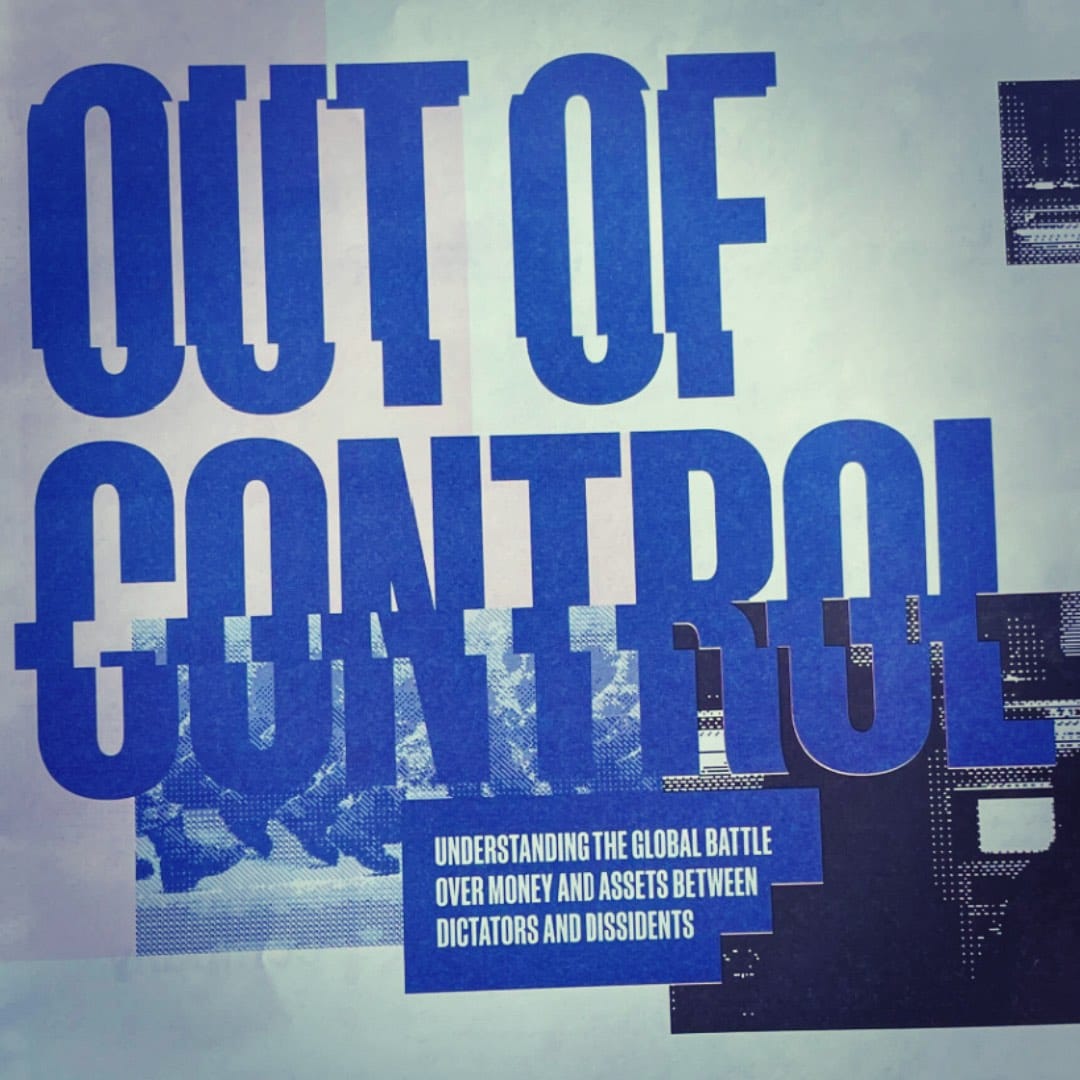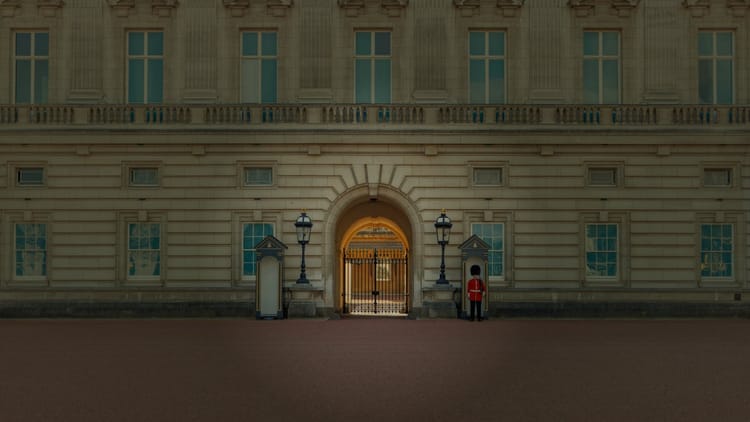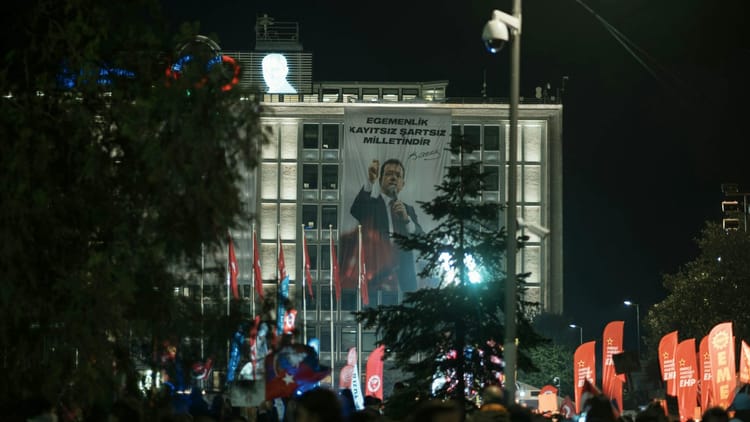Press and hold the power button

Recently: Is free speech in America under “unprecedented” attack?
Today: Why would the Pentagon need lie-detector tests to prevent the release of nonclassified material? Someone on the inside apparently thought you should know.
For members: Why do Europe’s leaders finally seem willing to seize Russia’s frozen bank assets? Sir William Browder on a potential turning point in the Ukraine war. ... & What’s the point of flying jets and drones into countries you’re not at war with—when you’re in the middle of a war?
+ New music from Lamin Fofana ...
Developments
- The feds go dark. The U.S. government is shut down as of midnight Wednesday after the Senate failed to pass a funding bill—the first U.S.-government shutdown in six years. Republicans control both chambers but need at least seven Democratic votes in the Senate; Democrats demand healthcare-subsidy extensions, Republicans want a “clean” continuing resolution. The White House has instructed agencies to consider permanent mass layoffs rather than typical furloughs.
- Polygraphs and NDAs at the Pentagon. The Washington Post has gotten hold of documents demonstrating that U.S. Defense Secretary Pete Hegseth plans random polygraph testing and strict nondisclosure agreements for more than 5,000 Pentagon personnel. The measures follow Tuesday’s Quantico gathering, where he and President Donald Trump told military leaders to use American cities as training grounds and treat domestic opponents as foreign threats.
- An uncommon statement from the Pope. Leo XIV spoke out Tuesday against “concerning” rhetoric at the Pentagon gathering and criticized those claiming to be pro-life while supporting the death penalty or “the inhuman treatment of immigrants.” He has generally avoided commenting on specific U.S. policies since becoming pope in May.
- Thoughts to the Philippines. A magnitude 6.9 earthquake struck the central Philippines Tuesday night, killing at least 69 and injuring more than 200. The shallow quake near Bogo City in Cebu Province collapsed historic churches, bridges, and buildings. Authorities recorded hundreds of aftershocks, while Cebu Province has declared a “state of calamity.”
- Valerie Jane Morris-Goodall, 1934-2025. Jane Goodall, the primatologist whose observations of wild chimpanzees reframed what it means to be human, died on Wednesday in California at 91. In 1960, Goodall, then 26, discovered that chimpanzees make and use tools—overturning the assumption that only humans could do that. Her 60-year career helped establish that primates have personalities, emotions, and complex social structures.

Press and hold the power button
These documents the Post has obtained—unauthorized disclosures about a crackdown on unauthorized disclosures—show plans to require all military service members, civilian employees, and contractors within the Office of the Defense Secretary and the Joint Staff to sign nondisclosure agreements prohibiting release of non-public information “without approval or through a defined process.” A separate directive establishes random polygraph testing for the same personnel—more than 5,000 people, from four-star generals to administrative assistants. Random polygraphs are standard in intelligence agencies; they’d be new at the Pentagon.
Tuesday’s Quantico gathering summoned hundreds of senior officers from Europe, the Middle East, and Japan to hear President Trump tell them they’d be called on to help “straighten out” Democratic-run cities “one by one” in what he characterized as “a war from within.” Hegseth told the commanders to be “prepared for war, not for defense” and warned that more firings would follow for anyone who disagreed.
Someone apparently spoke anyway.
Federal law already makes it a crime to disclose classified information. Federal regulations already bar the disclosure of sensitive but unclassified information. The new polygraphs and nondisclosure agreements represent a new layer on top of existing restrictions—what one former senior defense official called “pucker factor, scare tactics.”
Hegseth’s Pentagon has held six press briefings since January, kicked news organizations out of Pentagon office space, and now requires reporters to sign agreements not to gather even unclassified information without authorization. Now it seems to be bringing the spirit of those practices inside—toward personnel who will implement orders that aren’t classified secrets but policy decisions. Deploying American troops to American cities, as and when that occurs, is visible to everyone. The new polygraphs and NDAs protect something else: the decision itself.
The Signal’s new print extra is here. A limited-run newsprint magazine, Out of Control explores the global battle over money and assets between dictators and dissidents.
This special edition features conversations with Félix Maradiaga, Farida Nabourema, Roger Huang, and Justin Callais—on what financial repression is, how dissidents are using Bitcoin, why countries around the world are developing their own digital currencies, and what financial repression in the autocratic world has to do with financial freedom in democracies.
Currently available in the U.S.A. To register interest in ordering internationally, or with any questions, please be in touch: concierge@thesgnl.com.

For members
Billions on ice
On September 25, Germany’s Chancellor Friedrich Merz wrote an op-ed for the Financial Times, calling for Europe to take most of the roughly US$235 billion in Russian assets frozen in European banks and lend them to Ukraine—with Kyiv to repay the loan only when Moscow should pay it reparations, after the war.
Mertz’s position here represents a sharp break from most European leaders’ since Moscow’s 2022 invasion, but he’s not the only one making the argument now. Earlier in September, European Commission President Ursula von der Leyen said that the European Union was working out a similar mechanism to provide funding to Ukraine through the Russian Central Bank’s frozen money—in lieu of raising taxes on European voters.
And after meeting with Ukraine’s President Volodymyr Zelenskyy at the UN General Assembly last week, France’s President Emmanuel Macron said he was open to novel ideas for financing Kyiv’s war efforts—even though he’d repeated his rejection of seizing Moscow’s assets just a few days earlier.
Merz said he’d discuss the loan proposal with Europe’s heads of state at their meeting today, October 1, in Copenhagen.
Why are they talking about this now?
Mostly, it’s because European leaders don’t trust U.S. President Donald Trump to keep backing Ukraine, as Sir William Browder explains here in The Signal. And if Washington stops giving weapons and money to Kyiv, the consequences could be dire.
“The U.S. is currently responsible for 40 percent of Ukraine’s military aid,” Browder says. “If that support comes to an end, Russia will win the war.”
But for years now, the Continent’s leaders have been extremely reluctant to consider taking Moscow’s billions. Partly, they worry the Kremlin would expropriate the assets of Western companies in Russia, in turn, but they also worry about the lack of a legal basis for seizing the money, and so the precedent it would set. Those fears are largely baseless, Browder says. To the contrary, the EU and its member states could pass laws establishing exactly the principle this precedent would need …
Twelve minutes over Estonia
Three Russian MiG-31 fighters crossed into Estonian airspace on Friday, September 20, and stayed there for 12 minutes. Not a navigation error or brief incursion—they lingered, carrying missiles, in what Estonia’s foreign minister Margus Tsahkna called an “unprecedentedly brazen” violation. Tsahkna arrived at Monday’s emergency UN Security Council session with radar printouts and photographs as evidence.
The Estonian incident wasn’t isolated. Russian drones had breached Romanian airspace earlier in September. Poland shot down Russian drones over its territory that same month—the first time NATO forces had fired on Russian assets since the war began. On Monday, Copenhagen and Oslo airports closed after drone flights nearby, with Denmark’s Prime Minister Mette Frederiksen linking the incidents to Russian sabotage of European infrastructure. Moscow has been using GPS jamming to interfere with flights carrying top European officials, including European Commission President Ursula von der Leyen.
When confronted with Estonian evidence of the airspace violation, Dmitry Peskov, Russian President Vladimir Putin’s spokesman, dismissed the claims as “empty” and “unfounded”—despite the radar data and photographs.
What’s Russia trying to accomplish here?
Your loyal guide to a changing world.
Membership with The Signal means exclusive access to premium benefits:
- Regular profiles on the questions behind the headlines
- In-depth feature interviews with our network of specialist contributors from across America and around the world
- The despatch, our weekly current-affairs and cultural-intelligence briefing
- Early access to new products, including print extras
It also means vital support for an independent new enterprise in current-affairs journalism.
New music
‘Arc’s Blue Flame’
Lamin Fofana is a composer and producer who grew up in Sierra Leone and Guinea before moving to the United States when he was a teenager. Fofana makes electronic music adjacent to but distinct from club sounds. His newest record, Works in Metal, is a bracing tribute to the twentieth-century French writer and activist Suzanne Césaire.





